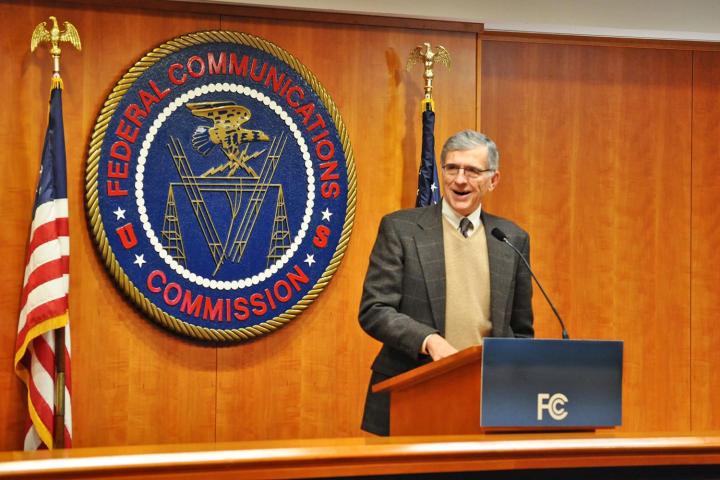
The FCC announced plans Tuesday to reclassify broadband ISPs like Comcast and Time Warner and mobile carriers like T-Mobile and AT&T, from “information services” to “telecommunications services.” Labeling them in any other way (as a processed food or a hatmaker or a sex aid) would have exactly zero effect. But calling them telecom services triggers an arcane aspect of federal regulation which lets the government do all sorts of stuff.
In theory it’s good. If it’s used to promote competition, it may even save you money down the road. And this is the government taking a stand on Net neutrality, the issue hundreds of thousands of people fought for, what John Oliver ranted about on HBO (brilliantly, I might add), and what porn stars dropped their tops and drawers to argue in favor of last year.
“Without Net neutrality, Internet service providers could create fast lanes for content providers willing to pay more,” explained porn star Mercedes Carrera. Yes, she said that, and she’s right.
The ramifications of reclassifying ISPs are all over the map, with more potential problems than a bad time-travel movie.
Telecom services are regulated under Title II of the Communications Act of 1934, which allows the government to restrict what they can and can’t do, something it does for all public utilities. Tom Wheeler, Chairman of the FCC, argues that this will benefit consumers and the public interest.
“My proposal assures the rights of Internet users to go where they want, when they want, and the rights of innovators to introduce new products without asking anyone’s permission.”
Well that all sounds good. After all, the worst case scenario of the Net neutrality debate is restriction of access.
Say your broadband provider let you visit only certain news sources, ostensibly those it owns. Or slowed your surfing speed to a crawl when you try to visit websites it doesn’t like. Wheeler wants to prevent that — to require service providers to supply unfettered Internet. Read the news, stream some video, play a game, it’s all the same. ISPs can’t be the gatekeepers to what you do. Stream House of Cards all you want!
On the flip side, the ramifications of reclassifying ISPs are all over the map, with more potential problems and conflicts than a bad time-travel movie.

The FCC wants to classify wireless carriers under Title II as well, which could end some programs. T-Mobile’s Music Freedom package lets you stream unlimited music from certain services that it has partnered with, including Pandora, iHeartRadio, iTunes Radio, Rhapsody, Spotify, and tons more. Streaming music from these designated services doesn’t count against your data allotment, letting you stick with a lower data package. That’s great, of course. Who doesn’t like saving money?
But say you want to start a music streaming service of your own. Call it Jeremy-ify or maybe Jerem.ly (that’s cool, right? Right?). The existence of the T-Mobile service is a barrier to entering the market for you, according to Wheeler, since T-Mobile customers wouldn’t be able to stream from Jerem.ly for free and therefore wouldn’t sign up. The FCC proposal would likely spell the end of T-Mobile’s service, removing that barrier to entry for my music service — but removing a neat service for T-Mobile customers that saves them money. Hmm.
“Net neutrality … is like a giant sex party, where everyone gets to have sex with whoever they want. Without Net neutrality, that sex party is only for rich people.”
AT&T is also playing this game and calling it “Sponsored Data.” Announced about a year ago, the program lets an app maker or company pick up the cost of you using their program. Listen to music on Jerem.ly and I’ll pay your data charges! Again, kinda great for the consumer, right? I suppose. But it’s very easy to see how this limits competition and ultimately shrinks down your choice of apps. If an app maker can’t afford to pay for user data, it’s hard to compete. Free is a great price, after all.
Needless to say, mobile carriers like AT&T and Verizon are fighting the FCC tooth and nail, and are prepping their best lawyers for the battle ahead.
Then there’s Netflix, a gorilla in the room if there ever was one. The streaming Internet TV service currently has arrangements with ISPs to help foot the cost of delivering its content. You can thank ISPs like Comcast for that. Reportedly, they strong armed Netflix into the move by slowing down service to some of its subscribers. The company now pays Comcast to ensure smooth delivery of its streaming content. On the one hand, it makes sense for Netflix to share the burden of streaming video, which amounts to over 30 percent of Internet traffic at some times. But it’s also unfair. Shouldn’t they also take a share of the profits from an ISP then, too? Who’s to say?
Netlix CEO Reed Hastings has fought for exactly the sort of regulation Wheeler just announced. In April of 2014, he wrote that “with strong Net neutrality, everyone avoids the kind of brinkmanship over blackouts that plague the cable industry and harms consumers. … Consumers deserve better.”
It’s impossible for ordinary folks to tell which company is telling the truth in the Netflix brouhaha. Some insiders argue that it’s not Netflix or even ISPs like Comcast to blame for slowdowns, it’s little-known companies like Level 3 that literally run the backbone of the Internet. Who knows? The deals are all private and confidential.
So who can you trust? Me, I trust those porn stars.
“Net neutrality … is like a giant sex party, where everyone gets to have sex with whoever they want. Without Net neutrality, that sex party is only for rich people.”
And, personally, that’s not the sort of sex party I want to go to.



